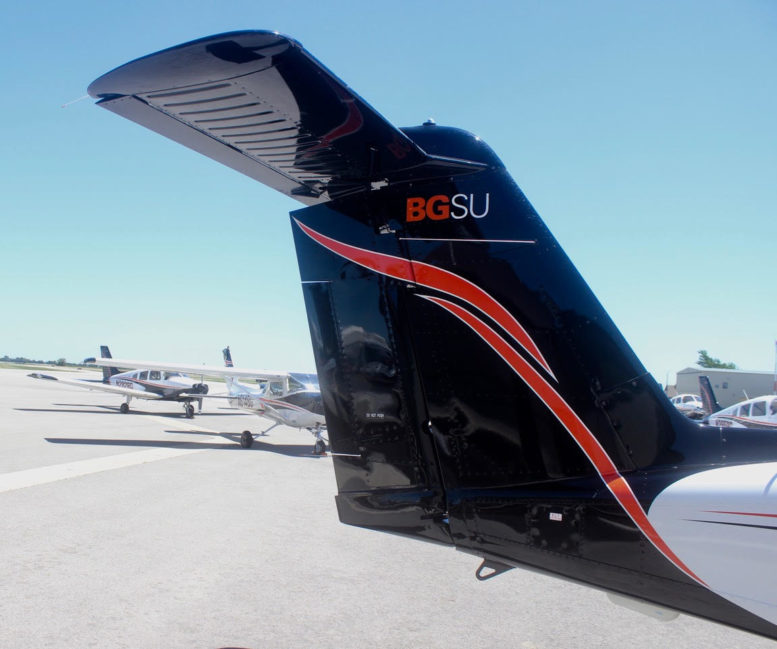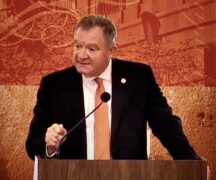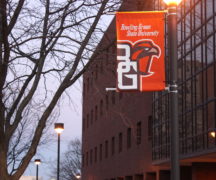By DAVID DUPONT
BG Independent News
The cost of learning to fly at BGSU just got higher.
The University Board of Trustees Friday approved increases in the special fees for aviation students.
The trustees also voted to raise the cost of meal plans by an average of 3.5 percent which brings the least expensive plan, the Bronze Plan, to $2,094 a semester, and the room rates by an average 3 percent, bringing the cost of a standard double room to $3,380. Under the Falcon Tuition Guarantee these rate increases only apply to the cohort of students who will arrive on campus in the 2024-2025 academic year, and stay constant throughout their four years on campus.
The aviation fees were addressed as part of the trustees’ annual consideration of special course fees. These fees are not restricted by the tuition guarantee. Sheri Stoll, the university chief financial officer, said, these are usually presented in February. Last February, the university did not propose any such fee increases because of concerns about the impact of inflation on students.
This year only aviation fee increases were proposed. They were approved unanimously.
Stoll noted that the fees are charged by North Star Aviation the Mankato, Minnesota-based company that operates the BG Flight Center through its contract with the university to provide flight training.
Stoll said those are pass through fees, with the university collecting them, and then paying North Star. BGSU does not charge any administrative fees for the transaction.
This makes it easier for students. Because they are paid to the university students can use scholarship money and their bursar accounts to pay the fees.
Aviation education is expensive, said President Rodney Rogers. Advanced commercial flight training will cost $16,300 next semester.
Materials provided the trustees explained that the fees are going up because of increased aircraft maintenance costs, flight operating costs, and capital improvements. The FAA also has increased the required training hours.
The association with North Star has allowed the program to vastly improve in terms of equipment, including aircraft, Rogers said. While that high quality equipment increases the cost to students, it makes the program more marketable.
The result, Rogers said ,was that BGSU’s program is one of the top programs in the Midwest.
Cecilia Castellano, the vice president of enrollment management, said in her interactions with prospective aviation students and their families during the Presidents Day, they are aware of the cost of the program.
Trustee Drew Forhan suggested that the board be presented with a comparison of the costs among BGSU and the three other state universities offering aviation.
In determining room rates, the university considers the financial pressures on students, the amenities offered, and the cost to maintain residence halls.
The residence halls are organized in four tiers, from basic to the Greek Village.
Options in Tier 1, the lowest, are narrowing though. When McDonald Hall comes back online it will be in Tier 2 because it will have air conditioning and other amenities. Kohl Hall will be off-line next year for air conditioning and other renovations. When it comes back it will be in Tier 2, leaving Kreischer as the only residence hall without air conditioning.
Factoring in the cost of tuition, meals, and room and board, BGSU is now the sixth least expensive in the state system with a cost of $24,125 for in-state students. It falls between University of Akron at $24,019 and Kent State at $25,714, BGSU had been fifth for many years, but Akron reduced it rooms rate, and bumped ahead.
Trustee Howard Traul asked whether BGSU should forego the increase to remain competitive.
Stoll noted that it is important both in housing and meals to set aside money for improvements and future needs.
Castellano said that the schools that are less expensive than BGSU are not the schools it competes with for students. Those schools including Kent, Miami, Ohio, and Toledo, are all more expensive.
Traul also noted that the university could not freeze prices for a single year. Because of the tuition guarantee, the freeze would apply for the four years the incoming class was here.





